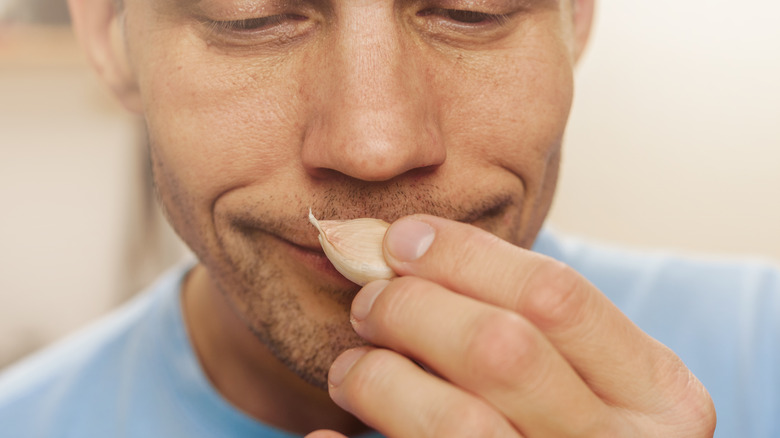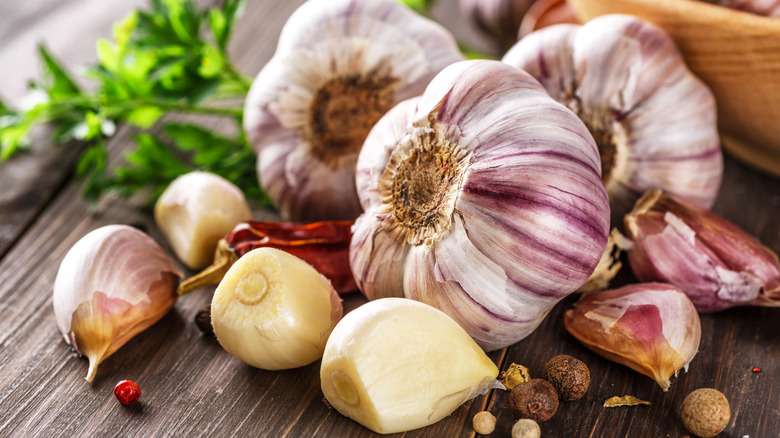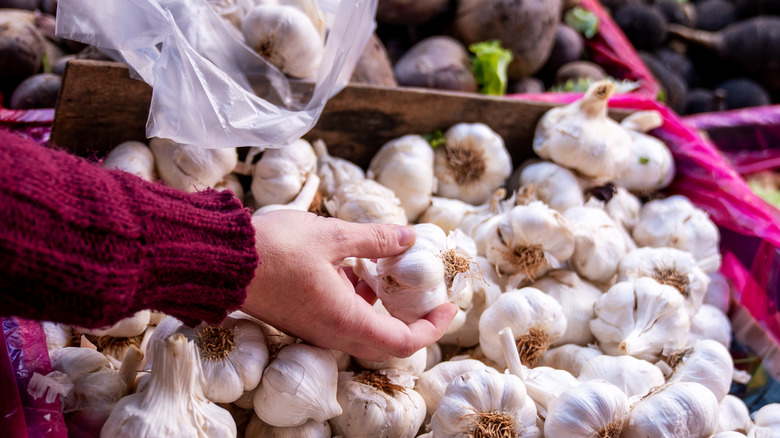Why You Should Avoid Buying Garlic That Smells Like Garlic
Imagine watching your favorite movie while snacking on crispy garlic chips or crackers. These spicy treats would melt in your mouth, leaving you craving more. Garlic can turn any meal into a feast. It's a perfect addition to french fries, slow-cooker beef stroganoff recipes, meatballs, cream soups, and other savory dishes. Its unique flavor comes from allicin, a naturally occurring sulfur compound.
"When fresh garlic is chopped or cut, you activate an enzyme called alliinase," explained gastroenterologist Will Bulsiewicz in an interview with Well + Good. This compound is converted to allicin, a substance with antioxidant, anti-inflammatory, antimicrobial, and cardioprotective effects. In clinical trials, allicin and other sulfur compounds have been shown to improve blood lipids, reduce blood pressure, and decrease cancer risk, according to the Linus Pauling Institute.
However, fresh garlic shouldn't have a strong odor unless you crush it. A pungent smell could be a sign of damage — and the explanation is quite straightforward.
Fresh garlic isn't supposed to have a strong scent
Allicin, the compound that gives this vegetable its distinct smell, is only released when you crush, chop, or chew the garlic. Therefore, fresh whole garlic should have very little or no odor. Chances are, it may have been damaged during storage or transportation if it has a strong smell. Your best bet is to sniff it, no matter how weird that might seem.
According to Bon Appétit, chopped garlic is only good for one day. So, if you buy a garlic head with missing pieces, it may not be safe to consume. In some cases, you may still be able to use it in cooked recipes (assuming it has no signs of rot), but it may not be as flavorful and nutritious as a fresh head of garlic. Plus, it might have brushes or blemishes that must be removed.
By comparison, intact garlic cloves can last up to six months, but their quality will start to decline as soon as you take off the outer peel. Also, note that improperly stored garlic, especially chopped garlic, can harbor dangerous bacteria and cause botulism, warns chef Julian Bond (per Western Living). He also advises against eating sprouted garlic, as it may carry salmonella and give you an upset stomach.
What to look for when buying garlic
Shopping for fresh garlic may seem like child's play, but it can actually be a bit difficult. A head of garlic can look perfectly fine on the outside and yet have one or more bad cloves. Cookbook author Bobby Parrish recommends checking the roots of each clove. If there are none, the garlic was most likely imported from places that use chlorine to mask blemishes and dark spots. Additionally, it might have been treated with neurotoxic chemicals, pesticides, and other potentially harmful compounds, warns Parrish (via YouTube).
The garlic grown in the U.S. has the roots intact and doesn't look perfect, as there might be some blemishes and darker areas on its skin — and that's perfectly fine. Parrish also advises not buying pre-cut or pre-peeled garlic, regardless of where it comes from. "Culinary speaking, it's nowhere near as good as freshly peeled garlic," he added.
Another piece of advice comes from Bon Appétit, which recommends buying fresh garlic that's firm to the touch. Ideally, get it from the farmers' market rather than grocery stores. Place it in a cool, dry place without removing the peel or breaking apart the gloves, and check it regularly to make sure it hasn't gone bad.


